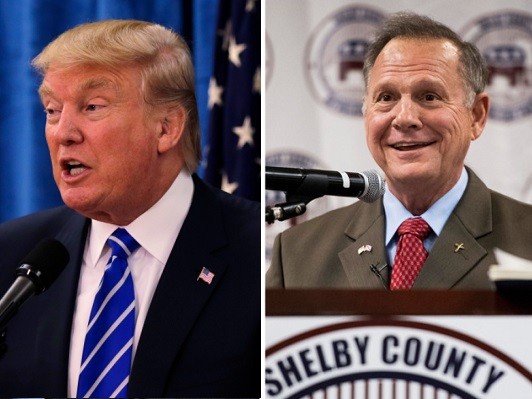In a post published Thursday, FiveThirtyEight senior political writer and analyst Harry Enten posits the theory President Donald Trump’s ability to influence GOP primary voters may not be as strong as some perceive.
That theory would be proven should Sen. Luther Strange (R-AL) loses his contest to former Alabama Supreme Court Chief Justice Roy Moore on September 26 in the Alabama U.S. Senate special election Republican primary runoff.
Although the margin varies, polling has consistently shown Moore with a lead over Strange.
According to Enten, if those numbers hold through the runoff, it raises questions about Trump as a GOP power broker headed into the 2018 midterm elections.
“If Strange does go on to lose the runoff (and there’s still nearly a month to go) — or even if it’s simply a close race — it would be easy to conclude that Trump has lost his ability to influence Republican primary voters. But maybe he never had much of that power to begin with,” Enten wrote. “The real lesson heading into the 2018 midterm cycle is that Trump should be smarter about who he endorses: “On-brand” endorsements can help, but Trump doesn’t have the power, for example, to make moderate Republicans vote for an uber-conservative, or vice versa.”
Trump endorsed Strange in the late stages of the campaigning for Republican primary held earlier this month, and that endorsement is thought to be what gave Strange the edge he needed over Rep. Mo Brooks (R-AL) to advance to the runoff.
However, a report from The Washington Post said Trump could be backing off his support of Strange for his runoff contest against Moore.
“[T]rump is considering being less engaged than in the first round of voting, when he tweeted his support and recorded a robo-call for the senator, they said — potentially turning the contest into yet another example of the frayed relationship between Trump and McConnell,” Robert Costa, Sean Sullivan and David Weigel wrote for the Post on August 25.
Ultimately, it may not matter. Enten argues endorsements like Trump’s matter in primaries where an “ideological cue” is given, but in case of Trump endorsing Strange, it may not be as effective because he says it “never made a lot of sense from either a messaging or policy standpoint.”
According to Enten, Moore has more in common with Trump — a populist politician running against the “establishment,” the exception being Moore’s “religious appeal.” In the end, Alabama Trump voters will make up their own minds on the runoff.
“The lesson of these different endorsements should be fairly clear: Trump voters aren’t mindless drones,” Enten wrote. “They’ll take cues from the president when he’s selling them on something it makes sense for them to back.”
If Moore does come out victorious later this month, it could change the playbook on how Trump should approach next year’s election.
“This has implications for the 2018 midterms — who comes out of the various GOP primaries — but it also says something about the landscape of modern American politics. In short: Trumpism isn’t limited to, or even (mostly) about, Trump,” Enten added.
Strange and Moore are competing for the Republican nod and will face Democratic nominee former Clinton U.S. Attorney Doug Jones in the general election in December for the seat formerly held by Jeff Sessions.
Follow Jeff Poor on Twitter @jeff_poor

COMMENTS
Please let us know if you're having issues with commenting.